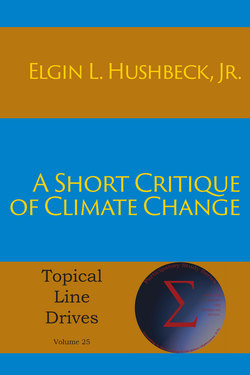Читать книгу A Short Critique of Climate Change - Jr. Elgin L Hushbeck - Страница 5
На сайте Литреса книга снята с продажи.
ОглавлениеPrequel: The Nobel Prize
The Nobel Prize, since its establishment in 1895, has become the symbol of singular excellence in broadening the horizons of a field of knowledge. It declares, someone has not only mastered the field, but has made a significant contribution to expanding it. Marie Curie won the prize twice, once in Physics and again in Chemistry. Albert Einstein won the prize for his work in Theoretical Physics and the discovery of photoelectric effect, while Werner Heisenberg won the same prize 12 years later for the creation of Quantum Physics.
To be a Nobel Laureate says something and gives instant status and clout to a man or woman of science. Thus, it is not too surprising in the ongoing debate over Climate Change to see so many of those raising the alarm about the impending danger pointing to their (or the scientist’s they are citing) status as a Nobel Laureate.
Rajendra Pachauri, for example, until recently the chairman of the premier Climate Change organization, the Intergovernmental Panel on Climate Change (IPCC), has frequently been described as “a Nobel Laureate” or as a “winner of the Nobel Prize”, as in this press release: “Speaking at today’s BMW Group sustainability summit in Berlin, Dr. Rajendra Pachauri, Nobel Laureate and Chairman of the UN IPCC…”
Not only do they make the claim for themselves, numerous high government officials, such as U.S. Secretary of State and Prime Ministers, along with government and non-government organizations like UNICEF and the World Wildlife Fund, and of course news outlets like the BBC and New York Times have likewise pointed this out about Pachauri and others working for the IPCC. After all, can you blame them when the stakes in the Climate Change debate are so high?
There are at least two problems with this; the first being that the prize in question is not the Nobel Prize in Physics or even Chemistry, fields that would relate to the science behind Climate Change. The 2007 prize being referred to is the Nobel Peace Prize. It was not won because of the scientific work on Climate Change, but for educating the public on the dangers of Climate Change based on the belief that, if left unchecked, Climate Change would lead to war.
The second problem really came to forefront in late 2012 when Michael Mann, the originator of the iconic Hockey Stick graph so key to Climate Change, and another of the many IPCC members prominently claiming their status as a Nobel Laureate, filed a lawsuit against some journalists and publishers criticizing his scientific work. In the words of his complaint filed with the court he argued they had tried “to discredit consistently validated scientific research through the professional and personal defamation of a Nobel prize recipient.”
Yet Pachauri, Mann and the others claiming to be Nobel Laureates based on the 2007 Nobel Peace prize are not, with one exception. The prize was given to the IPCC and Al Gore, so while Al Gore can legitimately make the claim, being part of the IPCC does not make one a Nobel Laureate any more than does being part of any of the many other organizations that have won the prize. Thus, shortly after Mann’s complaint was filed with the court, he had to amend the complaint and the IPCC posted on its website, the Peace Prize “was awarded to the IPCC as an organization, and not to any individual associated with the IPCC. Thus it is incorrect to refer to any IPCC official, or scientist who worked on IPCC reports, as a Nobel laureate or Nobel Prize winner.”
While ultimately of little importance in the overall debate over Climate Change this does highlight many of the key problems; the appeals to authority, inflated claims, media exaggeration, and how things change so drastically when one looks behind the curtain to see what is really going on.
